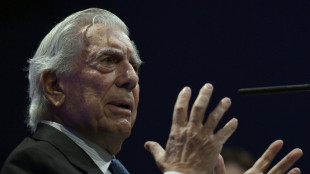
-
 Trump signs order aimed at lowering drug prices
Trump signs order aimed at lowering drug prices
-
Paramilitaries declare rival government as Sudan war enters third year

-
 Nvidia expects $5.5 bn hit as US targets chips sent to China
Nvidia expects $5.5 bn hit as US targets chips sent to China
-
Emery targets 'next step' for Aston Villa after Champions League heroics

-
 'Gap too big' for Dortmund after first leg, says Guirassy
'Gap too big' for Dortmund after first leg, says Guirassy
-
Maradona's daughter says doctors could have prevented his death

-
 Barcelona 'justified' semi-final spot despite Dortmund loss, says Flick
Barcelona 'justified' semi-final spot despite Dortmund loss, says Flick
-
'We thought the tie was over': Dembele admits PSG switched off against Villa

-
 Wine consumption falls heavily into the red
Wine consumption falls heavily into the red
-
Barca through to Champions League semis despite Guirassy hat-trick

-
 Global stocks mixed amid lingering unease over trade war
Global stocks mixed amid lingering unease over trade war
-
PSG survive Aston Villa scare to reach Champions League semis

-
 Pandemic treaty talks fight late hurdles
Pandemic treaty talks fight late hurdles
-
Trump resurrects ghost of US military bases in Panama

-
 Family seeks homicide charges against owners of collapsed Dominican nightclub
Family seeks homicide charges against owners of collapsed Dominican nightclub
-
Sudan paramilitary chief declares rival government two years into war

-
 Boeing faces fresh crisis with US-China trade war
Boeing faces fresh crisis with US-China trade war
-
Trump eyes slashing State Department by 50 percent: US media

-
 Canada offers automakers tariff relief, Honda denies weighing move
Canada offers automakers tariff relief, Honda denies weighing move
-
Facebook added 'value' to Instagram, Zuckerberg says in antitrust trial

-
 French Ligue 1 clubs vote to break TV deal with DAZN
French Ligue 1 clubs vote to break TV deal with DAZN
-
Peru court sentences ex-president Humala to 15 years for graft

-
 Sumy buries mother and daughter victims of Russian double strike
Sumy buries mother and daughter victims of Russian double strike
-
Trump says ball in China's court on tariffs

-
 Kane urges Bayern to hit the mark against Inter in Champions League
Kane urges Bayern to hit the mark against Inter in Champions League
-
Trump ramps up conflict against defiant Harvard

-
 Arteta feeding Arsenal stars 'opposite' of comeback message
Arteta feeding Arsenal stars 'opposite' of comeback message
-
France's Macron honours craftspeople who rebuilt Notre Dame

-
 Watkins left on Villa bench for PSG return
Watkins left on Villa bench for PSG return
-
Chahal stars as Punjab defend IPL's lowest total of 111 in 'best win'

-
 French swim star Marchand considered taking year-long break
French swim star Marchand considered taking year-long break
-
Chahal stars as Punjab defend IPL's lowest total of 111

-
 Universal Studios, Venice Beach to host LA 2028 events
Universal Studios, Venice Beach to host LA 2028 events
-
IOM chief urges world to step up aid for Haiti

-
 French prisons hit by mystery arson and gunfire attacks
French prisons hit by mystery arson and gunfire attacks
-
Alcaraz follows Ruud into Barcelona Open last 16

-
 Stocks rise on bank earnings, auto tariff hopes
Stocks rise on bank earnings, auto tariff hopes
-
Trump showdown with courts in spotlight at migrant hearing

-
 Ecuador electoral council rejects claims of fraud in presidential vote
Ecuador electoral council rejects claims of fraud in presidential vote
-
Russia jails four journalists who covered Navalny

-
 Trump says China 'reneged' on Boeing deal as tensions flare
Trump says China 'reneged' on Boeing deal as tensions flare
-
Trump eyes near 50 percent cut in State Dept budget: US media

-
 Trump says would 'love' to send US citizens to El Salvador jail
Trump says would 'love' to send US citizens to El Salvador jail
-
'Unprecedented' Europe raids net 200 arrests, drugs haul

-
 Everyone thinks Real Madrid comeback 'nailed-on': Bellingham
Everyone thinks Real Madrid comeback 'nailed-on': Bellingham
-
NATO's Rutte says US-led Ukraine peace talks 'not easy'

-
 Harvey Weinstein New York retrial for sex crimes begins
Harvey Weinstein New York retrial for sex crimes begins
-
More than 10% of Afghans could lose healthcare by year-end: WHO

-
 Stocks rise as auto shares surge on tariff break hopes
Stocks rise as auto shares surge on tariff break hopes
-
Facebook chief Zuckerberg testifying again in US antitrust trial


Meta news ban intensifying Canadians' legacy media break
As Canada heads into an election this month, voters looking for campaign news on Facebook or Instagram will find material filtered through online creators and influencers -- and no links to articles from major media outlets.
For more than a year, social media giant Meta has cut access to news websites on its sites, rebuffing Canada's government over a law called the Online News Act and its requirement that platforms compensate journalism outlets for their content.
Because of the quirks of how this blockage is applied, users can still find news content on Meta-owned platforms in screenshots, memes and videos, but sometimes lacking the context of traditional reporting.
"It's just not necessarily coming from those highest quality sources," said Angus Lockhart of the Dais public policy think tank at Toronto Metropolitan University.
With more people getting information from platforms, the ban appears to further undermine the role of traditional journalism in an election cycle.
Aengus Bridgman, director of the Canadian Media Ecosystem Observatory, found users' engagement with content from news media was never strikingly high but said now, many lack even a peripheral exposure to outlets’ coverage of current events.
He said these shifts in consumption will lead to "less and less broad understanding of politics and more and more hyper-focused issue orientations."
Other countries have seen similar declines in legacy media, but Chris Arsenault, chair of the journalism and communications program at the University of Western Ontario, said the ban is exacerbating the process in Canada.
“It’s leading candidates themselves and often citizen journalists or influencers to spread their messages to voters directly on social media platforms,” he said.
- Navigating the echo chamber -
Jasmin Laine is a Manitoba-based content creator whose political commentary videos get hundreds of thousands of views on Instagram.
She told AFP she found mainstream news to be overly critical of Canada’s Conservative Party.
"Being transparent about my viewpoint doesn’t mean I’m abandoning accuracy," she said.
Laine said users were looking for different angles to receive news heading into an election while she found traditional outlets were too quick to label alternative forms of media as misinformation.
Toronto Metropolitan University's Lockhart said misinformation levels across platforms are not easy to track, but noted that a belief in false or misleading claims appears to be associated with a preference for social media as a news source.
A reliance on political commentary from secondary sources "increases the risk of existing in an echo chamber if someone else is filtering the news for you,” he said.
Rachel Gilmore repackages her independent reporting into short-form videos and said she was encouraged to see mainstream news outlets utilizing YouTube and TikTok to reach voters with election updates.
But she was still nervous about how news content on these platforms was sourced and fed to users.
"There's so many people out there who are delivering the news who might not necessarily be journalists -- some of them are doing a great job. Some of them aren't and that's hard for Canadians to navigate," she said.
- Remove barriers -
TikTok and X do not currently have obligations under the law which triggered Meta's news block, while Google paid out a multi-million dollar sum to a Canadian journalism fund this year.
Meta's newest platform, Threads, does not appear to adhere to the ban, and some video content from news organizations and individual journalists also evades restrictions, particularly on Instagram.
Christopher Curtis, founder of The Rover, which covers local issues in Quebec, recently started posting videos explaining his reporting -- sometimes speaking while he practices boxing.
"We are letting them in on the reporting process and that we're finding really helps," he said
His award-winning outlet took an engagement hit after The Rover’s account was blocked by Meta, but Curtis said the thousands of followers its contributors had accrued showed people are hungry for local coverage.
Going into the election, Curtis said he hopes his reporting provides a contrast to more toxic, hyper-partisan content.
"Present a more nuanced, calmer, more interesting version of the truth and I sincerely believe that that's the antidote,” he said.
F.Fehr--VB



